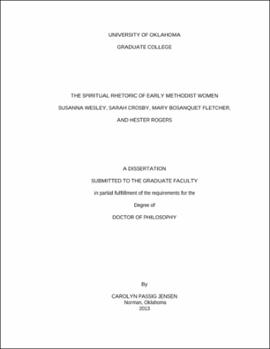| dc.contributor.advisor | Hobbs, Catherine | |
| dc.creator | Jensen, Carolyn Passig | |
| dc.date.accessioned | 2019-04-27T21:34:14Z | |
| dc.date.available | 2019-04-27T21:34:14Z | |
| dc.date.issued | 2013 | |
| dc.identifier | 99308936502042 | |
| dc.identifier.uri | https://hdl.handle.net/11244/319042 | |
| dc.description.abstract | This dissertation examines the rhetorical features of letters and journals composed by Susanna Wesley, Sarah Crosby, Mary Bosanquet Fletcher, and Hester Rogers, all prominent and influential women in the early years of the Methodist religious movement in Great Britain in the eighteenth century. These women were all personally acquainted with John Wesley, the founder of Methodism; Susanna Wesley was John's mother. | |
| dc.description.abstract | To provide helpful heuristics to aid in the study of these, and other, early Methodist texts, three perspectives of Jewish-Christian rhetoric are examined and juxtaposed to form a new theoretical and methodological model of spiritual rhetoric. Similarly, several theoretical spaces that focus on feminist rhetoric are compared, contrasted, and then combined to create a model that considers the voices, knowledge, texts, and experiences of women rhetors. | |
| dc.description.abstract | Susanna Wesley, Sarah Crosby, Mary Bosanquet Fletcher, and Hester Rogers--and their texts--are introduced with an overview of the birth and early years of Methodism. This historical summary helps explain the women's purposes for writing, the spiritual beliefs which informed their texts, and the impact of their words on readers. | |
| dc.description.abstract | Susanna Wesley is shown to be an intellectual woman with strong religious and political viewpoints which she persuasively asserts in letters to her husband, Samuel Wesley and others. Sarah Crosby and Mary Bosanquet Fletcher, both early Methodist preachers, defend women's preaching in letters written to John Wesley. The evolution and development of John Wesley's views and authorization of women's preaching is also traced. Finally, the spiritual experience journal of Hester Rogers is analyzed to show how Rogers creates spiritual rhetoric for her own persuasive goals. | |
| dc.description.abstract | In their letters and journals, Susanna Wesley, Sarah Crosby, Mary Bosanquet Fletcher, and Hester Rogers combine many rhetorical appeals to form their own distinctive persuasive and empowering spiritual rhetoric. Through rhetorical analysis of their texts, this study shows the power and influence these women's discourse had upon the establishment and shaping of the Methodist religious movement, and it contributes to broadening scholars' interpretations of the revolutionary creativity and inventiveness of women's rhetoric by suggesting new understandings of how four eighteenth-century early Methodist women constructed their persuasive message despite the constraints of their patriarchal culture. | |
| dc.format.extent | 212 pages | |
| dc.format.medium | application.pdf | |
| dc.language | en_US | |
| dc.relation.requires | Adobe Acrobat Reader | |
| dc.subject | Methodist women | |
| dc.subject | Rhetoric | |
| dc.title | The Spiritual Rhetoric of Early Methodist Women Susanna Wesley, Sarah Crosby, Mary Bosanquet Fletcher, and Hester Rogers | |
| dc.type | text | |
| dc.type | document | |
| dc.thesis.degree | Ph.D. | |
| ou.group | College of Arts and Sciences::Department of English | |
